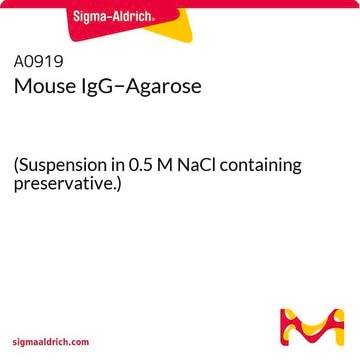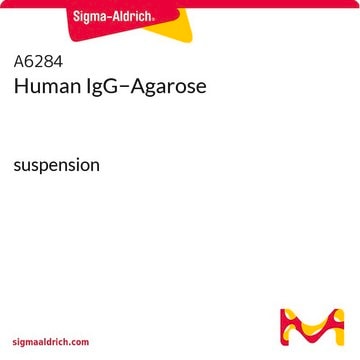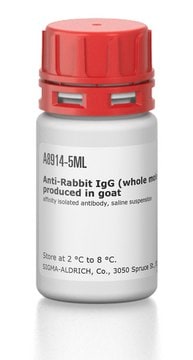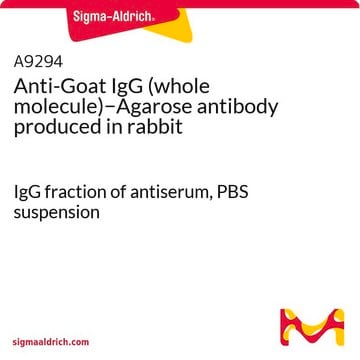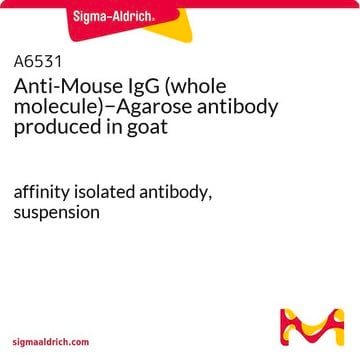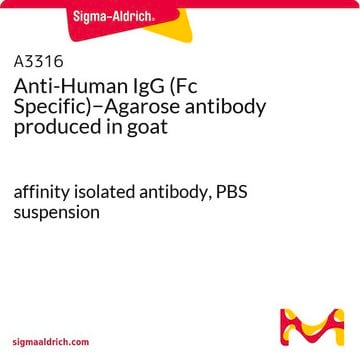A2909
Rabbit IgG−Agarose
saline suspension
Synonym(s):
IgG agarose beads
Sign Into View Organizational & Contract Pricing
All Photos(1)
About This Item
Recommended Products
conjugate
agarose conjugate
Quality Level
form
saline suspension
extent of labeling
≥5 mg per mL
technique(s)
immunoprecipitation (IP): suitable
matrix
cross-linked 4% beaded agarose
matrix activation
cyanogen bromide
matrix spacer
1 atom
storage temp.
2-8°C
General description
IgGs are glycoprotein antibodies that modulate several immune responses. IgG-Agarose is an immunoadsorbent that can be used to purify antibodies, remove species specific cross-reacting antibodies, or remove contaminating antibodies from an antiserum preparation. Characteristically, cross-reacting antibodies may be removed from an antiserum preparation using an equal resin volume of IgG-Agarose. However, the resin to antiserum ratio will vary with individual applications. Immunoglobulin G (IgG) is part of the immunoglobulin family and is a widely expressed serum antibody. It consists of a γ heavy chain in the constant (C) region. The monomeric 150kDa structure of IgG constitutes two identical heavy chains and two identical light chains with molecular weight of 50 kDa and 25 kDa, respectively. The primary structure of this antibody also contains disulfide bonds involved in linking the two heavy chains, linking the heavy and light chains and resides inside the chains. IgG is further subdivided into four classes namely, IgG1, IgG2, IgG3, and IgG4 with different heavy chains, named γ1, γ2, γ3, and γ4, respectively.
Application
Rabbit IgG antibody (20 μl/ml) crosslinked to agarose beads was used to isolate RAT tagged proteins from whole cell extracts of 293T cells.Rabbit IgG crosslinked to agarose beads were used for purification of tagged protein from mammalian whole cell extracts at 0.5 to 1.0mg total protein to 10 μl of beads.
Rabbit IgG-Agarose has been used for immunoprecipitation and affinity purification assays.
Physical form
suspension in 0.5 M NaCl containing preservative.
Disclaimer
Unless otherwise stated in our catalog or other company documentation accompanying the product(s), our products are intended for research use only and are not to be used for any other purpose, which includes but is not limited to, unauthorized commercial uses, in vitro diagnostic uses, ex vivo or in vivo therapeutic uses or any type of consumption or application to humans or animals.
Storage Class Code
10 - Combustible liquids
WGK
WGK 3
Certificates of Analysis (COA)
Search for Certificates of Analysis (COA) by entering the products Lot/Batch Number. Lot and Batch Numbers can be found on a product’s label following the words ‘Lot’ or ‘Batch’.
Already Own This Product?
Find documentation for the products that you have recently purchased in the Document Library.
Customers Also Viewed
Antibody structure, instability, and formulation
Wang W, et al.
Journal of Pharmaceutical Sciences (2007)
Guixin Du et al.
PloS one, 8(12), e81583-e81583 (2013-12-21)
Human cytomegalovirus protein IE2-p86 exerts its functions through interaction with other viral and cellular proteins. To further delineate its protein interaction network, we generated a recombinant virus expressing SG-tagged IE2-p86 and used tandem affinity purification coupled with mass spectrometry. A
David Atencio et al.
G3 (Bethesda, Md.), 4(3), 523-537 (2014-01-29)
The Ess1 prolyl isomerase from Saccharomyces cerevisiae and its human ortholog, Pin1, play critical roles in transcription by regulating RNA polymerase II. In human cells, Pin1 also regulates a variety of signaling proteins, and Pin1 misexpression is linked to several
D L Lafontaine et al.
Genes & development, 12(4), 527-537 (1998-03-21)
Many or all of the sites of pseudouridine (Psi) formation in eukaryotic rRNA are selected by site-specific base-pairing with members of the box H + ACA class of small nucleolar RNAs (snoRNAs). Database searches previously identified strong homology between the
Emmanuel Vanrobays et al.
RNA (New York, N.Y.), 14(10), 2061-2073 (2008-08-30)
Eukaryotic ribosome synthesis is a highly dynamic process that involves the transient association of scores of trans-acting factors to nascent pre-ribosomes. Many ribosome synthesis factors are nucleocytoplasmic shuttling proteins that engage the assembly pathway at early nucleolar stages and escort
Our team of scientists has experience in all areas of research including Life Science, Material Science, Chemical Synthesis, Chromatography, Analytical and many others.
Contact Technical Service